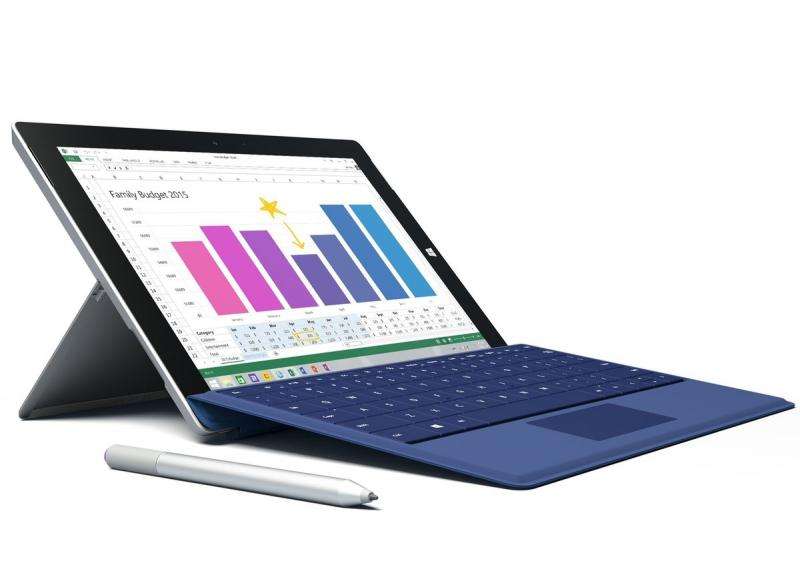Tablets like the Apple iPad are fun, but they're not exactly a replacement for a full-blown computer.
As an iPad user, I've often wondered whether it could ever take the place of my laptop.
Alas, the answer is no - not yet, at least.
Apple's iOS is a nice operating system, but it can't run Macintosh apps.
Windows users are lucky - they can have the best of both worlds: the small size and large touch-screen of a tablet along with a full copy of Windows and the ability to run all their favorite Windows programs.
I've been using a Microsoft Surface 3 tablet for the last week, and it's a pretty darn good Windows computer.
It's even better because the version I used is the new Surface 3 LTE with built-in cellular data from AT&T.
If you remember your Microsoft Surface history, each generation of Surface tablets had two versions - a cheaper version called Surface, which ran a neutered operating system called Windows RT, and a more expensive version called Surface Pro, running a full version of Windows.
The Windows RT Surface computers ran on ARM processors, which is why they didn't run full Windows. Surface Pro tablets ran Intel processors.
Starting with the Surface 3, both the Surface and the Surface Pro use Intel processors and can run a full version of Windows 10, although the Surface 3 LTE model I used ships with Windows 8.1.
A QUESTION OF HARDWARE
The difference between the Surface 3 LTE ($499 with a data contract) and the Surface Pro 3 (starting at $799) is in the hardware.
The Surface 3 LTE ships with an Intel Atom X7 quad-core processor running at 1.6 GHz with 2 gigabytes of RAM and 64 gigabytes of storage. It has a 10.8-inch display.
To give you some reference, the lowest-priced Surface Pro 3 has a 12-inch display with an Intel Core i3 CPU running at 1.5 GHz with 4 gigabytes of RAM and 64 gigabytes of storage.
You can also go crazy and spend up to $1,799 on a Surface Pro 3 if you max it out.
The Surface 3 LTE's display has a resolution of 1920 by 1080 pixels with 802.11ac Wi-Fi and Bluetooth 4.0 plus 4G LTE.
To supplement the onboard storage, the Surface 3 LTE has a microSD card slot to accommodate up to 128 more gigabytes of storage. The physical dimensions are 10.5 inches by 7.36 inches by 0.34 inches, and it weighs 22.4 ounces.
Besides Windows 8.1, the tablet comes with a one-year subscription to Office 365 with full versions of Word, Excel, PowerPoint, Outlook and more.
The Surface 3 LTE has a full-size USB 3.0 port and a Mini DisplayPort, so you can attach any USB accessory and output to a larger monitor.
The built-in kickstand now can adjust to three viewing angles, which is great when you use the Type Cover, a $129 option. The Type Cover has a built-in trackpad to control the Surface's pointer.
EASY SETUP
Even though I use a Mac, I had no problem setting up the Surface 3 LTE to do all my work tasks. The Type Cover's trackpad is easy to use, but it's not very big, so I did prefer to use a mouse with the Surface 3 LTE.
I connected hard drives and thumb drives, and easily connected my external monitor.
I do wish the Surface 3 LTE had more RAM. Windows can get a bit bogged down with just 2 gigabytes of RAM. Given the speed of this tablet running Windows 8.1, I'm not sure I could recommend upgrading to Windows 10.
To be fair, Microsoft lists 2 gigabytes of RAM as the minimum requirement for Windows 10, but I wish there were more RAM available, even if it cost more money.
Overall, the Surface 3 LTE is a great starter computer and a really nice tablet. You will need to get set up with a data plan, but it's pretty inexpensive to add to an existing AT&T family plan.
—-
Pros: Runs Windows, nice accessories, bright and clear touch display.
Cons: Needs more RAM, Type Cover is expensive.
Bottom line: Great size and features make this a good choice for those who aren't power users.
©2015 The Dallas Morning News
Distributed by Tribune Content Agency, LLC.























